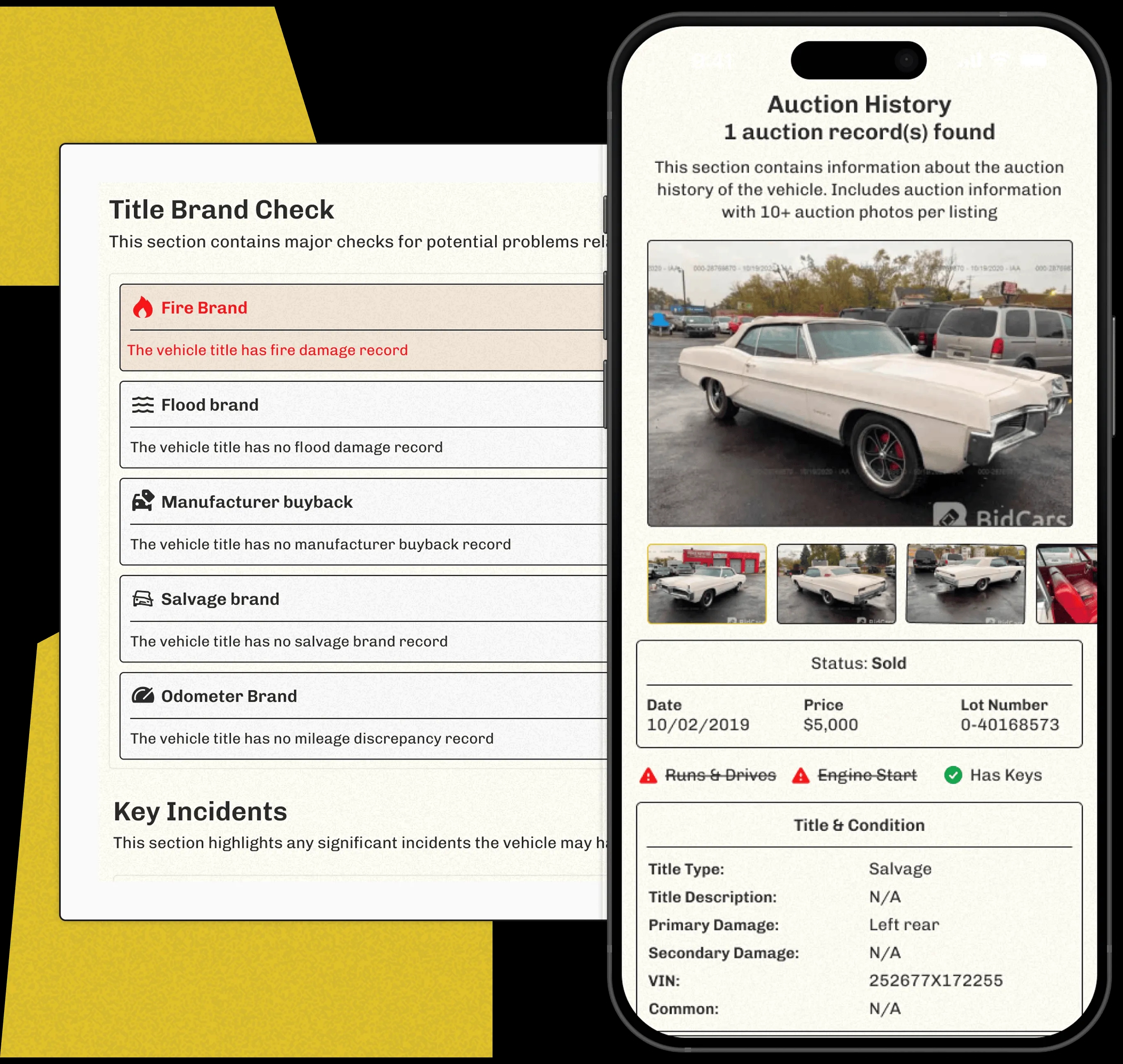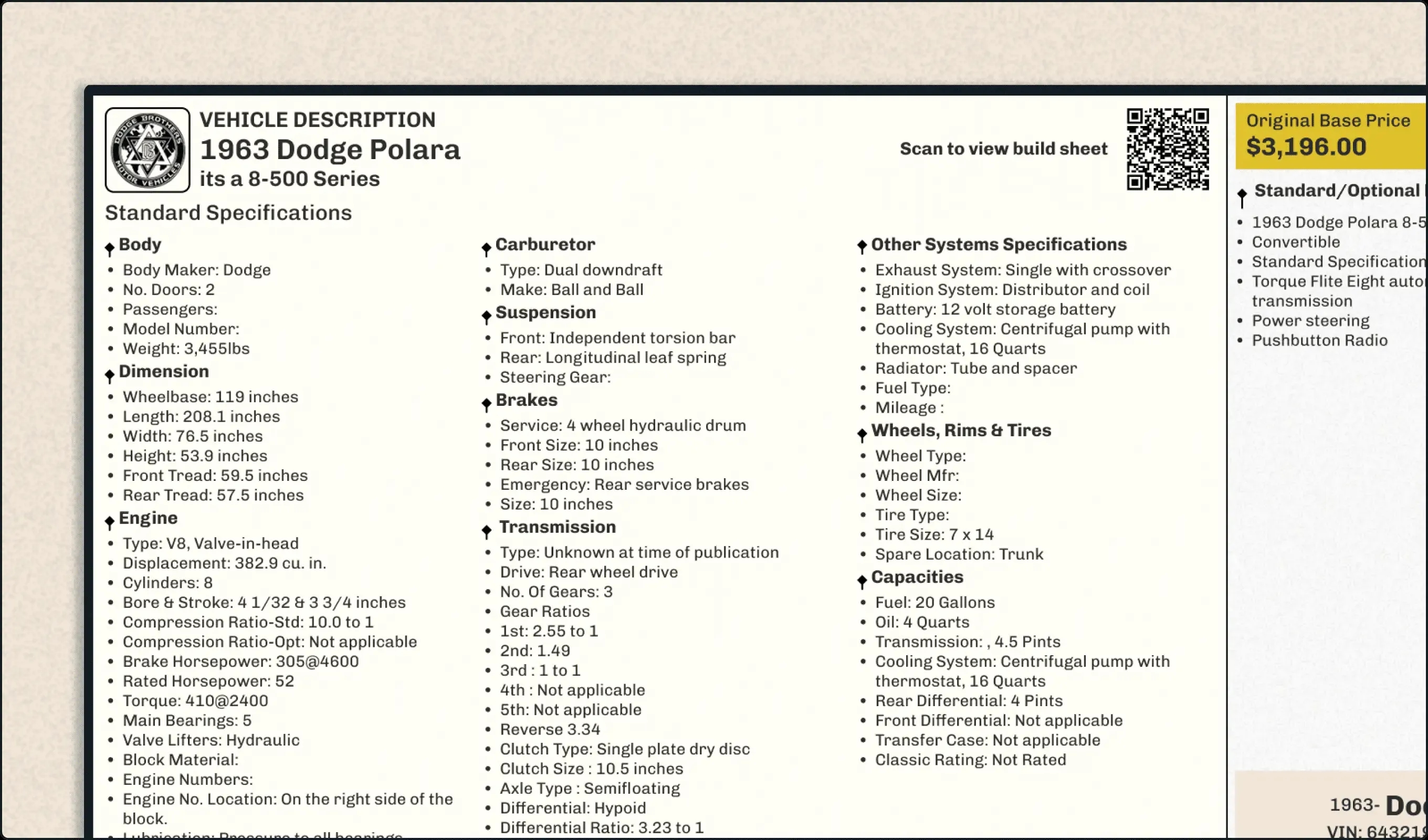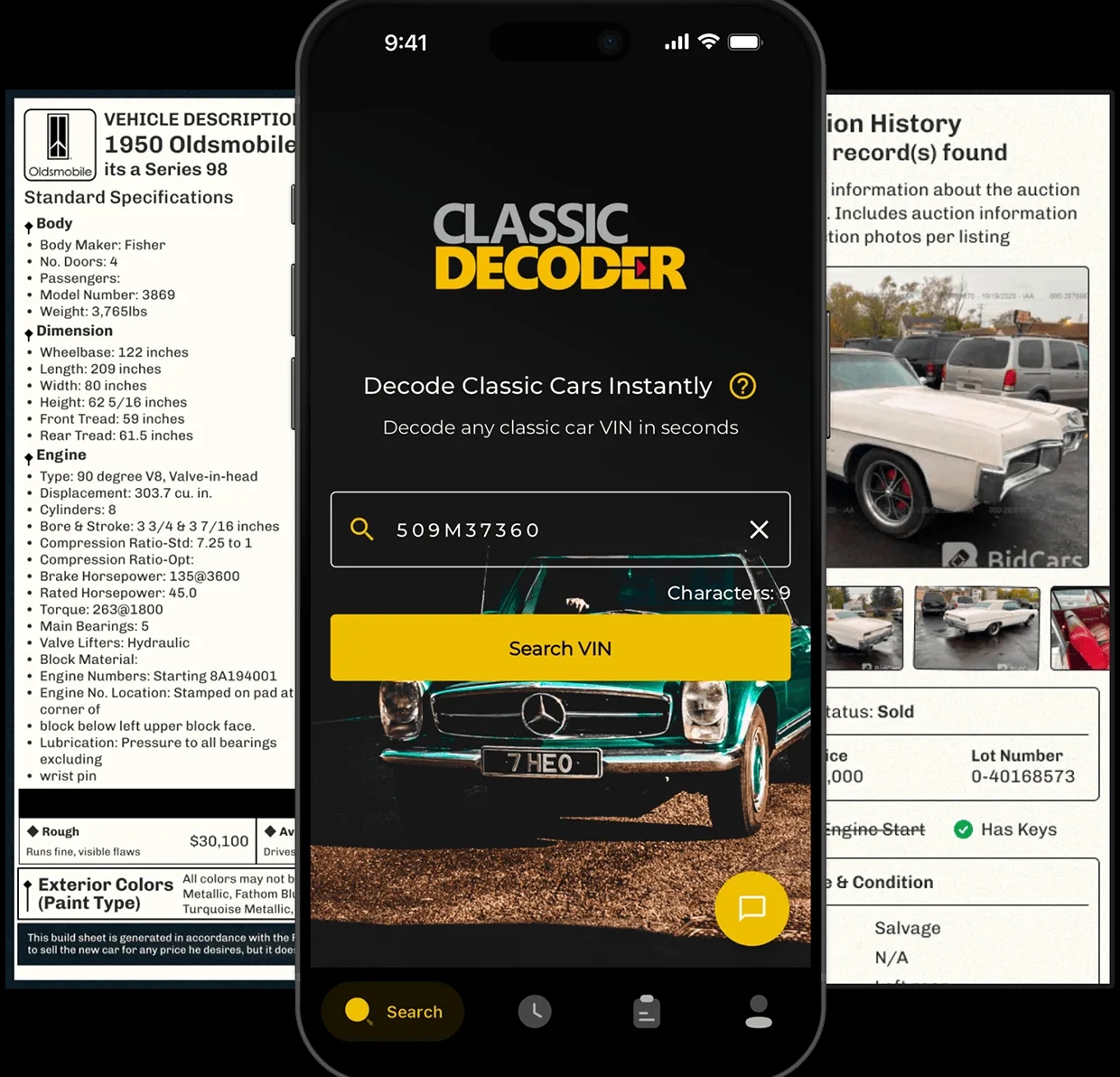1968 Plymouth VIP
The 1968 Plymouth VIP? Think understated cool. A bigger, slightly fancier version of the Satellite, it wasn't flashy, but reflected a late-60s vibe. Solid, reliable, and a bit more luxurious than your average muscle car. Not hugely significant historically, but a nice slice of automotive Americana. Its clean lines and subtle details made it a quietly stylish ride.
Decode Classic VINs to Get Vehicle History Report and Build Sheet
The 1968 Plymouth VIP: A Luxurious Legacy
The 1968 Plymouth VIP stands as a remarkable example from an era when luxury and performance in American cars were evolving rapidly. It represented Plymouth's foray into the upscale market, attempting to capture the imaginations—and the wallets—of buyers seeking elegance wrapped in a full-size sedan. This model aimed to rival contemporaries like the Chrysler New Yorker and Ford LTD, boasting sophisticated styling and an array of lavish features that spelled out comfort and class for its owners.

1968 Plymouth VIP Models:
Select the vehicle's model to see the correct data for it.
How Much is Plymouth VIP Worth?
Original MSRP :$3,325.00
Outstanding
Clean
Average
Rough
1968 Plymouth VIP Specs
Interested in buying a classic car or selling one?
Access detailed history reports for classic vehicles from hundreds of manufacturers.
- Accident Records
- Theft Records
- Loan & Lien Information
- Auction Information
- Salvage Information and more

History of the 1968 Plymouth VIP
Introduced as part of an ambitious endeavor to climb the luxury ladder, the 1968 Plymouth VIP marked a pivotal moment for the Plymouth brand. Based on the more pedestrian Fury line, this model distinguished itself with elegant details and more refined interiors. Its release couldn't have been better timed, aligning perfectly with a shifting customer preference towards vehicles that promised not just power, but style and comfort in equal measure.
Learn more about a classic car: Get Build Sheet by VIN.
Access reproduced classic build sheets to learn more about your classic vehicle details.
- Standard Specifications
- Original Base Price
- Standard & Optional Equipment
- Exterior & Interior Colors
- VIN ID & Location description

Specifications of the 1968 Plymouth VIP
The VIP came equipped with a range of engines to suit various performance appetites. It started with a 225 cubic inch slant-six, moving up to robust V8 options such as the 318, 360, and even a 440 cubic inch powerhouse used in police sedans. It was notable for its blend of a smooth driving experience with sufficient muscle under the hood—a balance many sought in the luxury market.
Market Reception and Pop Culture Presence
Upon its debut, the VIP was praised for striking a fine balance between luxury and performance—a feat reflected in its interior's plush details and inclusion of high-tech comforts like power windows and premium sound systems. These features were not just novelties but indicative of the model's aspirations to compete with the luxury behemoths of its time. Meanwhile, the car found its own niche in pop culture, appearing in films like Stephen Spielberg's Duel, symbolizing the era's love affair with sleek yet powerful American cars.
1968 Plymouth VIP Gallery







Popular Figures Who Own the 1968 Plymouth VIP
However, you may be curious about which of the rich and famous have counted themselves as VIP owners. Unfortunately, specific names aren't readily available in current archives, but rest assured, the car's allure caught the eye of many high-profile collectors. In the world of celebrity and classic cars, owning such a model would only complement the caché afforded by other high-end acquisitions.
Frank Sinatra
While the list is speculative, imagine Frank Sinatra sliding into the driver's seat, the car a complement to his urbane lifestyle. Sinatra's famed flair for the finer things certainly sets the stage for a potential match with this luxurious Plymouth model.
Elvis Presley
Then there's the King of Rock 'n' Roll. Elvis Presley was notorious for his passion for cars, especially American classics. A 1968 Plymouth VIP would fit right into his collection, a testament to its sumptuous style and spirit.
James Garner
Finally, we can envision actor James Garner behind the wheel of a Plymouth VIP. Known for his roles in racing-themed films, Garner's penchant for powerful cars makes the VIP a credible pick for his garage.
Pricing Through the Years
Originally, the 1968 VIP was pegged at around $3,300—equivalent to nearly $30,742 in today's dollars. Over the years, its market value has soared, particularly for well-maintained examples that fetch a premium among collectors. Its price range, which started from $3,420 up to a theoretical high of $166,900, speaks volumes of its prestigious position in Plymouth's hierarchy.
Interested in Buying or Selling a Classic Car?
Whether you're buying your dream classic car or selling a beloved piece of history, knowing the story behind the vehicle is crucial. Get a comprehensive understanding of a for essential details. If you're diving into the world of classic cars that pre-date 1981, a is your key to uncovering the past.
Ensuring You're Informed
Accident Records
Theft Records
Loan & Lien Information
Auction Information
Salvage Information and more
Tools like the provide indisputable details that can make or break a deal, whether it's a or a . They're not to be overlooked when verifying authenticity and tracing the car's saga, whether for nostalgia or investment.
Finally, remember the unique details of each vehicle with the , essential for understanding the factory specifications and any modifications or restorations made through its journey. It's the perfect culmination of the meticulous documentation necessary for a well-informed transaction in the world of classic cars.
Classic VIN Decoder App |Now available on both Android and iOS!
At Classic Decoder, we believe that developing a mobile app is a great way to extend our classic car data solution hub to as many users as possible across the globe. Our app is built with users and precision in mind. It holds the key to unlocking the history and details of any retro car at your fingertips. It also comes with fascinating and user-friendly features that make it stand out from other mobile apps designed for this purpose.
The Classic Decoder app lets you decode and lookup any classic VIN in a flash. Access accurate vehicle information and history, make an informed decision faster, and buy and trade in classic cars with confidence.

Download The Classic Decoder App now.
Some unique features include:
- Support all classic VIN lengths from 5 to 13 digits
- Support classic cars produced from 1910 – 1980
- Online Garage features – to add and manage your vehicles
- 24/7 Customer Support
- Easy onboarding for first-time users
Explore Plymouth VIP from Other Years
Frequently Asked Questions
The '68 Plymouth VIP, well, it was a bit of a sweet spot, you know? It sat nicely between the base models and the more luxurious offerings. Think of it like the Goldilocks of Plymouths that year—just right! It offered a good balance of comfort and performance without breaking the bank, which is always a plus, especially back then. It wasn't quite as flashy as some of its siblings, but it had a certain understated elegance; a quiet confidence, if you will. It's a pretty good choice for someone who wants a classic muscle car without all the bells and whistles, or, you know, the hefty price tag.
Now, the engine choices for a '68 VIP were pretty diverse, actually. You could get everything from a sturdy, dependable six-cylinder—a workhorse, really—to some seriously powerful V8s. The V8s, let me tell you, were the real head-turners. Those things could really move! It's hard to say which one was the 'best'—it really depends on what you're looking for. Do you prioritize fuel efficiency, raw power, or something in between? You know, it's like choosing between vanilla, chocolate, and strawberry ice cream. It all comes down to personal preference! Check the original brochures for the exact specs, just to be on the safe side.
Like any classic car, the '68 VIP has its quirks. It's not uncommon to run into issues with the electrical system; that's just kind of a given with cars of that age. The carburetor can also be a bit finicky; those things can be a real pain sometimes. And then there are the usual suspects: the brakes, the suspension, and sometimes, you might have some trouble with the transmission. It's always best to get a thorough inspection from a mechanic who's familiar with these classic cars before you buy one. You don’t want any nasty surprises down the road, trust me. Think of it like getting a pre-purchase inspection for a house; it's a smart move.
Ah, the million-dollar question! The value of a '68 VIP really depends on a lot of things: condition, mileage, options, and the overall market. It's tough to give a precise number, much like trying to guess the weight of a cloud. You could be looking at a range from a few thousand to tens of thousands, depending on the state of the car. Your best bet is to check online classic car valuation resources and browse recent auction results for comparable vehicles. It's a bit of a detective game, but it'll give you a pretty good idea of what to expect.
Finding parts for a classic car can sometimes feel like searching for a needle in a haystack, but luckily, there are many good resources. You have your online retailers specializing in classic car parts, local auto parts stores that might surprisingly carry some things, and then there are always those classic car swap meets and forums. These are places where enthusiasts often trade and sell parts. Networking within the Plymouth community will also be a good way to get to know where to find specific parts that are scarce. It's a community effort, you see. Sometimes you gotta be creative, but you can find practically anything if you put in the effort.

